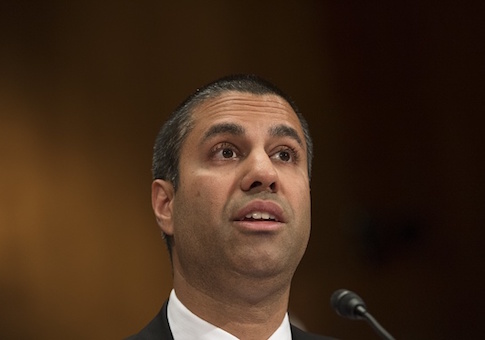The Federal Communications Commission's Ajit Pai is returning federal regulation of the internet to a "much more rational" approach by repealing net neutrality, the chairman said in an interview with the Washington Free Beacon.
Pai says he holds the "very radical" position once held by former Democratic president Bill Clinton: a hands-off approach to allow the internet to continue to flourish free from burdensome government rules.
Aside from more creative criticisms, the media are painting the repeal of the Obama administration's unprecedented regulation two years ago as a Republican-led FCC siding with industry over consumers.
The New York Times claimed repealing the rules, which for the first time in history classified Internet Service Providers (ISPs) as public utilities, giving the government broad regulatory power, is "putting more power in the hands of those companies to dictate people's online experiences."
However, the rules had unintended consequences of curbing unlimited data streaming plans popular with consumers and restricting investment to expand broadband in rural and low-income areas, Pai said.
"We were not living in some digital dystopia prior to 2015," Pai said. "Until the FCC decided to save us from ourselves by invoking Great Depression era regulations designed for Ma Bell."
Taking direction from former president Barack Obama, the FCC approved the broad regulatory scheme over the internet in 2015. The vote was shrouded in secrecy, with former chairman Tom Wheeler not releasing the text of the nearly 400-page net neutrality rule until two weeks after the FCC voted to approve it.
Soon after, the FCC used the rules to investigate and propose fines for cell phone providers such as Verizon, AT&T, and T-Mobile for offering popular unlimited data plans that offer free streaming at a lower cost.
Pai says the Obama-era FCC had "finally met the enemy, and the enemy was giving something that consumers wanted for free."
"It's a very strange line of business for the federal agency to be involved in," he said. "And that's why going forward, at least, we want to make a much more market-based approach."
Pai said his Restoring Internet Freedom Order would return the regulatory authority to the Federal Trade Commission, which can then investigate telecom companies for anticompetitive practices, such as blocking or throttling traffic.
"We, number one, want to make sure that ISPs are disclosing everything they do," he said. "And if there's truly something anticompetitive then the Federal Trade Commission can take action against anybody in the internet economy, not just ISPs, but anybody based on this longstanding authority. That's a much more rational way of handling these issues."
The FCC voted to begin the process to repeal net neutrality in May. Pai released his proposal Wednesday, giving the public and the commission more than three weeks to consider before the FCC takes a vote on Dec. 14.
Pai said releasing the text prior to the vote was a "big break" from the previous administration, which did not disclose its rules until weeks after the vote had been taken.
"Back then the agency refused to let the American public see what it was proposing to do until after the vote actually happened," he said. "To me, that was putting the cart before the horse. So this time around we are going to make it public."
"It's important in terms of openness and transparency to let people see, even if they ultimately disagree with it, what the FCC is going to do," Pai said. "That's something I think was sorely lacking in the past administration."
Pai said it is necessary to repeal the net neutrality rules because of their effect on broadband investment. Capital expenditure in broadband declined by 5.6 percent since Title II was adopted in 2015, which amounted to over $3.6 billion in lost investment.
"These heavy-handed regulations as we find in the order are having an effect on investment and innovation, making companies less likely to raise and spend capital building out networks, especially in rural, and low-income urban America," he said. "We see that in the record, too, that some companies have held off with new service offerings because they're not sure whether they would be allowed under the rules."
Prior to the rules, the internet economy was able to flourish free from regulation, Pai said.
"We are taking the very radical position as a Republican FCC that President Clinton got it right in the 1990s that a market-based approach to the internet is the right way to go," he said. "The history of the internet from 1996 until 2015 is one of unparalleled innovation."
"We got the internet economy that is the envy of the world precisely because we rejected heavy-handed regulation from the get-go," Pai added. "So, that's definitely what we're proposing to return to, the bipartisan consensus [that] governed the internet for many years."
Under Pai's leadership, the FCC will continue working to expand broadband access, which was hindered under net neutrality. Currently, over 62 million do not have access to fast internet, mostly in urban centers and rural areas.
"When I travel around the country, I see Americans who are on the wrong side of the digital divide," Pai said. "What they are telling me is not that their ISP is blocking access to lawful content, it's that they don't have access at all, or that they don't have enough competition. So removing these regulations will help give consumers and companies of all kinds to be able to participate in the digital economy in a way they aren't able to now."
"My hope is that by removing these rules we will promote more competition and infrastructure investment," he said. "And I think the entire digital economy will be better off for it."
